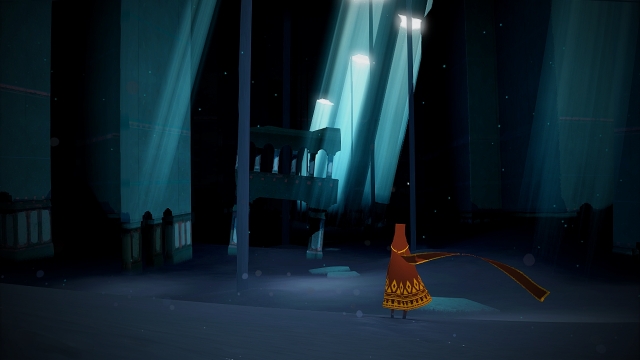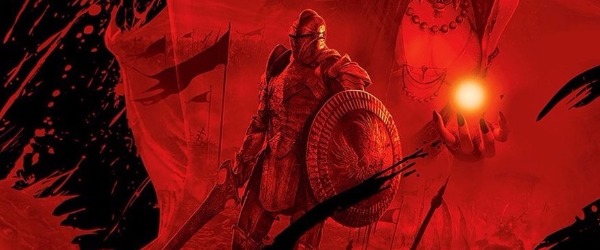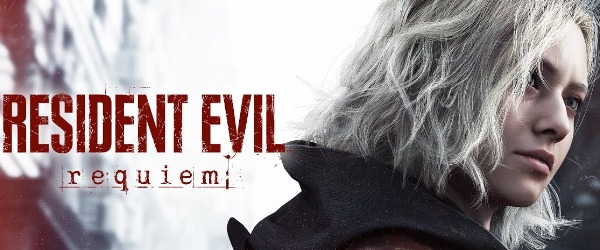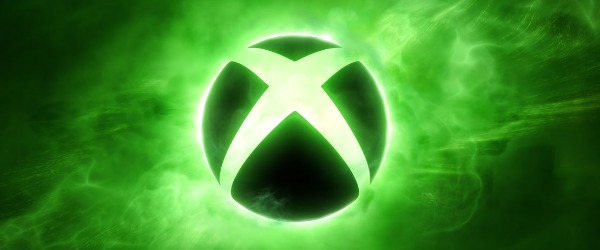
Interview: We Chat with Grammy Award Nominee Austin Wintory - Article
by VGChartz Staff , posted on 13 December 2012 / 3,511 ViewsWe recently had a chance to chat with composer Austin Wintory – the man behind the Journey OST - about his recent Grammy nomination, composing music for video games and movies, and everything in between.
Unfortunately, everything from the interview couldn't be included in the article, as it would have simply been too long – and let’s face it, it’s pretty long already. I didn't want you to miss out, though, so you can listen to the original interview - and even download it if you wish - by clicking right HERE. I can assure you that you’ll find plenty of extras in the audio version, so it's well worth having a listen. If you don't have time for that though, here are some of the best bits, chosen just for you.
Chris: Congratulations on the Grammy nomination
Austin: Thank you, it’s been unreal.
Chris: It’s historical, when you consider the implications
Austin: Yeah, I’ve had a lot of conversations with people to that effect. The way I look at it is that it may be the first to be recognised by the Grammys, but it’s not the first that is worthy of recognition by the Grammys. Why this task has fallen to me I don’t really know, but if the only thing to happen because of the nomination is that it calls attention to the other work being done by composers, that to me would be worthwhile. I wouldn’t feel remotely short-changed or cheated at all by that, because I think there’s a lot of really wonderful work being done and if this casts a light on that then that’s really exciting and meaningful to me.

Chris: Did it come as a shock to you, or is it something that you saw coming for the industry as a whole?
Austin: It was definitely a shock. I knew that they were eligible, but it was completely unexpected. I knew that it was possible, because there was a procedure for submitting your music, which Sony did, I didn’t actually do. Nonetheless it was one of those things that I didn’t really expect to happen and then retroactively I was even more shocked when I saw who I was nominated against.
Chris: How did you find out? Did you find out at the same time as the rest of the world?
Austin: In theory yes. I didn’t get a call from the Grammys or anything like that, they don’t call the nominees. The way that it happened was really quite special, and sort of by accident, which is that of all the people I could’ve heard it from, I heard it from Chris Tin, the composer of Baba Yetu – the only other person to ever be nominated and in his case won twice for what was originally a video game score. He emailed me, and I was sitting here and I knew they were announcing the nominees and I knew it was going to be around a certain time. Anyway, I was working late and I thought, I’m just going to drive home and by the time I get home the website will probably have been updated and then I can just see and know one way or the other. So, I got in my car to drive home and 5 seconds after I’ve gotten in my car I get an email from Chris in all caps that says congratulations, so I called him and I asked him what do you mean, and he told me that I’d been nominated. I was pretty shocked, and he stops and says “wait a minute, am I breaking the news to you right now?” cause he figured I already knew. It was the perfect way for me to have been told and in hindsight I just thought that it really was exactly how I would have dreamt it.
Chris: It’s kind of poetic.
Austin: Yeah, it felt like, not so much a passing of the torch, but more like I held out my unlit torch and let him ignite mine off of his flame so that we could burn together. It really was a special moment.
Chris: Journey has been nominated alongside some really big movie names, such as The Dark Knight Rises. Having composed for both movies and games before, would you say it’s easier to compose for one or the other?
Austin: It’s not easier no, they have different parameters for success. Film is very linear, so it operates within the very traditional musical needs, as if you were writing a symphony. Games have that in common, but obviously the interactive element has no comparison anywhere else, so there is a technical aspect to writing music for games that really nothing else can compare too. That doesn’t make them better or worse that just makes them anomalous. I really love them both. I love writing music for film, I love writing little orchestral pieces, little chamber pieces, my own albums, just generally having fun, but games do obviously hold a special place in my heart.
Chris: Where do you even start when it comes to composing music for games? I imagine films to be more linear, so does that affect the process?
Austin: There’s still a lot of variability about how one goes about scoring a film. I’ve worked on films where I had to start writing music based on a script, then I’ve worked on other ones where I had to turn it around in two weeks because the movie was basically done already. I’ve actually had the same exact situation in games. I worked on Journey for 3 years, but then I followed it up with an iOS game called Horn.
Chris: I actually reviewed that game.
Austin: Yeah? What did you think?
Chris: I really enjoyed it, I thought it was great. I was doing a bit of research, and I was initially surprised to see that you had scored Horn, but then it clicked into place because it’s got a really good soundtrack.
Austin: Thank you very much; it was a really fun thing to do. That was the diametric opposite of Journey - I had a little over three weeks to score the whole game, for practically the same amount of music that I scored for Journey, which was three years. None of which actually answers your question, which was how do you get started? I guess I’m giving a roundabout answer which is to say that the way you get started is so different every time that the game and the people who make the game, they dictate how you get started.
Chris: For me Journey was such an emotional game. It’s such a concentrated experience, and it’s really cathartic at the same time. When you’re creating music for video games rather than movies, do you have to bear this emotion in mind? Do you have to take on board what people are going to feel?
Austin: I think they’re more similar than not. My goal is always a tight-rope act. In many ways you are providing the emotional content, yet I’m not trying to dictate how you feel. What I hope I’m doing is creating a space in which you are invited to feel how you’re going to feel. There are certain places where if it’s supposed to feel a little bit creepy, or if it’s meant to be exciting, I’ll infuse the music with those things, but I don’t want to do it in a way where I’m manipulating you into feeling something that you wouldn’t otherwise feel. You have to be very authentic towards the game experience and sometimes the game experience is very multi-dimensional. In that sand surfing section you are surfing through the destroyed remains of old buildings as part of that. Jenova (Chen) said that he didn’t want it to be pure joy, he wanted there to be a halo of poignancy around the music because you are in an environment that is inherently sad in a distant way. The music then had to have a weightiness to it that’s in the subtext while of course being energetic and fun and all these other things. The emotional depth of Journey is certainly beyond that of most games, and this is because Journey is solely about that emotional experience. With Journey, I approached it as if I was the games narrator and I wanted to tell you a story, but I wanted how you felt about the story to be a personal internalised experience.
Chris: Would you say that this has definitely been your favourite job, out of all the jobs you’ve had?
Austin: It’s hard to say favourite, because I’ve been lucky and worked on a lot of games and a lot of films that have meant a lot to me. I would say that it’s the most personally affecting thing I’ve ever worked on. It has reached deeper down into me than anything else; I’ve emerged a different composer than the guy that they hired, but flOw did the exact same thing to me. I fundamentally changed course as a composer after scoring flOw.
Chris: This leads me on to the next place I want to take the interview which is the debate surrounding whether games are an art form, or whether they are just simply games. Do you think that the Grammy nomination will make it easier for people to get on-board with this idea that games are art?
Austin: Obviously, my opinion on this is very predictable. The notion that games aren’t art strikes me as odd because it’s so arbitrary. Art is not a thing, art is a mindset. Art is a lifestyle choice - you can be a janitor and be a brilliant artist, if you decide you want to be an artful janitor. And it’s all about how you choose to live your life. If you live your life in a way that is challenging yourself, that is excited by new discoveries, that is looking to bring something of meaning to people. It’s not a thing that I’m talking about.
Chris: It’s a mindset.
Austin: Exactly. Art is a process; it’s not a thing, so of course games are art. The Grammy nomination will only further reveal the disparity between the points of view. There is going to be some people who say that the Grammys mean nothing, because if Justin Bieber can win a stack of Grammys then that’s the metric of music as an art form? I don’t think so. I’m not knocking Justin Bieber, I’m just using him as an example. The point is that there are just as many people who see the Grammys as a big honour, as there are who see them as a load of crap. People will naturally see the Grammy as furthering their viewpoint on this subject, no matter which viewpoint they fall under. This makes me feel that it’s not even an argument, it’s not even a debate, and people aren’t going to make up their mind on that one. The thing that really bewilders me is that I don’t even understand why we’re having this debate because I don’t understand why anybody cares. Especially the people who are convinced it's not an art, I don’t understand what they get from it not being art. I don’t get what they gain from telling somebody you are not an artist, that thing you make is not an art. I don’t understand, it makes no sense to me.
Chris: Yeah, it doesn’t benefit them in any way.
Austin: How does that make the world a better place for them to be right? I just don’t get it, it makes no sense to me, I just think you need a hobby or something man, you’re fixated on something that doesn’t matter. Obviously I firmly believe that it’s an art form, I believe that cinema was the dominant art-form of the twentieth century, and I believe that games will be the dominant art-form of the twenty first century.

Chris: I’m going to play the devil’s advocate just for a second, because I can see why some people would argue that video games aren’t art. When you see games such as Call of Duty, and Assassins Creed for example, you know, the major franchises, it would be hard to convince someone that those have artistic qualities, largely because it’s so subjective.
Austin: That’s the thing, that’s the mindset. I see your point, but to me I have no trouble in countering. If we say that Journey is a work of art, but Assassins Creed isn’t, we’ll I’d have several responses to that. I’d ask you, what is it about Assassins Creed that doesn’t make it a work of art? It’s a big blockbuster franchise, but what makes it not a work of art? The consumption of a work of art is just as much about mindset about the creation of art. For example, no one debates that movies are works of art; everyone seems to come to the conclusion that movies are an art form.
Chris: I’d have to disagree with that. You look at movies like The Expendables for example.
Austin: That’s exactly what I was going to say, but people don’t dispute that overall movies are an art-form. They may not agree on which ones are the masterpieces, but again, it’s all about mindset. What if I went and saw The Expendables and I was horrified by its portrayal of violence and it turns me into a Buddhist monk pacifist and I had a spiritual revelation of revulsion to the movie? If I allowed it to creep into my soul and to affect me that way then has it not now become a great work of art? Art doesn’t have to be about portraying something that is aesthetically beautiful; the effect of it is beautiful. To me there are circumstances where The Expendables would be considered a great work of art. It doesn’t do any good to automatically dismiss it. So, to me, Assassins Creed isn’t by default not art, even if for me personally I’d rather play Journey, but that said, I’m thirty five hours into Assassins Creed III so for me everything stands a chance.
Chris: Would you say it’s just a case of waiting for the medium of video games to expand? When we look at movies, they’re something that expanded massively over the twentieth century, and are now considered art. Is it simply a matter of time until video games do the same?
Austin: Oh yeah we’re infants that are wobbly standing; we’re not even walking yet. What’s so exciting to me about working in games, and being in the fortunate position that I am where I can work on these wonderful, artful games like Journey and The Banner Saga, is the fact that I feel like I’m on the frontier, the leading edge of something and I really don’t know where it’s going. I have fantasies, but it’s in such an infantile state that you could never predict where it’s going. At best Journey might be something that in fifty years from now we might consider quaint.
Chris: Hopefully that would be the case!
Austin: Yeah, to me that’s not a sad thing. If where we go is so incredible that Journey seems like this quaint little experiment, then I’d rather be working in the place that makes Journey look quaint, than have the ego of saying I’ve made this masterpiece. I’d rather look back on it and think that was horseshit compared to what we’re doing.
Chris: What would you say your favourite piece of video game music is?
Austin: For me this comes from a nostalgia place, and I’d have to say that the score to Grim Fandango is very, very dear to my heart, and that’s probably my favourite game of all time as well. That score, particularly the Tango Love theme for Manny and Meche just goes straight to my soul. It’s not complicated, it’s not noteworthy because of some gimmick; it just came into my life at a point where my heart was ready to listen to the inherent romance of it. It’s just beautiful, it was one of the first experiences I’d had in a game that revealed to me just how special a game could be.
Another score and game that is more recent, that means a great deal to me is BioShock. This is because as the Hans Zimmer aesthetic became part of every score coming out, BioShock came out and was very classy and elegant. I’m not implying that by default the Hans Zimmer is bad. I’m just saying that trying to say “How epic can we be? How bombastic can we be?” became, and still is, the dominant trend. It was really gathering a lot of steam around then. I remember I was playing that game and I felt bad for the guys that I was killing, because they’re all crying and delirious. They’re all these raving madmen who are victims of society. I remember it was the first time I’d played a game that was a straight forward FPS that had this powerful subtext to it that really got to me, and I thought 'this is a really compelling drama'. As a shooter it’s fun, and I enjoyed the dilemma of harvesting or saving the little sisters, but just the sheer theatrical creepiness of the main enemies, not the Big Daddies, but these innocent civilians who are like mental patients, I felt bad for them. I felt that Gary’s score was a window into that, because you’ll be wandering through these corridors in Rapture hearing a solo violin singing out, creating this air of desperation. You’re not hearing creepy ambient stuff, though there was some of that too of course. The score to me had a heart to it and a soul that was disturbed and beautiful.
Chris: Well that rounds things off nicely, it’s been a real pleasure talking to you and good luck with the Grammys!
Austin: Thank you!






















 Essay Pro
Essay Pro